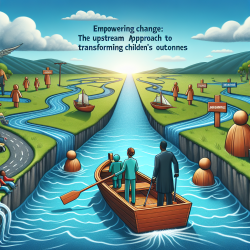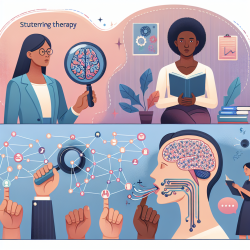Empowering Change: The Upstream Approach to Transforming Children's Outcomes
In the realm of speech-language pathology and child development, the focus has traditionally been on addressing immediate needs and symptoms. However, a transformative approach, known as "upstreaming," is gaining traction, promising to create lasting change by addressing the root causes of health and social inequities. This approach, detailed in the research article "Medical-Legal Partnerships Reinvigorate Systems Lawyering Using an Upstream Approach," highlights the potential for systemic advocacy to improve outcomes for children.
Understanding the Upstream Approach
The upstream approach involves identifying and addressing the underlying factors contributing to health and social issues, rather than merely managing symptoms. This concept, borrowed from public health, encourages practitioners to look beyond individual cases and consider the broader systemic factors at play. For speech-language pathologists and other child-focused professionals, this means considering factors such as socioeconomic status, access to resources, and environmental influences when developing intervention strategies.
Implementing Upstream Strategies in Practice
Medical-Legal Partnerships (MLPs) exemplify the upstream approach by integrating legal advocacy with healthcare to address social determinants of health. These partnerships have shown that by tackling systemic issues, such as inadequate housing or unjust policies, practitioners can create more equitable health outcomes for children.
For practitioners looking to adopt this approach, consider the following strategies:
- Collaborate Across Disciplines: Work with legal professionals, educators, and community organizations to identify and address systemic barriers affecting children's health and development.
- Advocate for Policy Change: Engage in advocacy efforts to influence policies that impact child health, such as access to quality education and healthcare services.
- Focus on Prevention: Develop interventions that target the root causes of health disparities, such as poverty and discrimination, to prevent issues before they arise.
Case Study: The Pediatric Advocacy Clinic
The Pediatric Advocacy Clinic (PAC) at the University of Michigan Law School provides a compelling example of upstream advocacy in action. By addressing systemic issues, such as inconsistent school policies on do-not-resuscitate orders, the PAC has successfully improved health outcomes for children. This case study demonstrates the power of upstream strategies to create lasting change and serves as a model for practitioners seeking to implement similar approaches.
Encouraging Further Research and Implementation
While the upstream approach offers promising avenues for improving child outcomes, further research is needed to refine these strategies and assess their impact. Practitioners are encouraged to explore the original research and consider how these concepts can be integrated into their practice. By doing so, they can contribute to a broader movement towards systemic change and better outcomes for children.
To read the original research paper, please follow this link: Medical-Legal Partnerships Reinvigorate Systems Lawyering Using an Upstream Approach.










